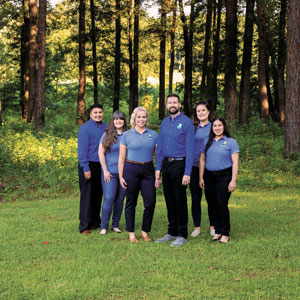
The Native Pest Management leadership team is comprised of, from left, Daniel Mendez, Shauna Crissey, Caitlin Lewis, Luke Lewis,
Emily Osgood and Jessica Garcia. (Photo: 2022 Jonathan Allai)
Switching from the FBI to pest management may seem like an unlikely career move, but that’s exactly what Luke Lewis did.
Until 2015, the founder and president of Tallahassee, Fla.-based Native Pest Management was an FBI intelligence analyst who specialized in counter-terrorism and helped special agents investigate suspected terrorists.
“I always dreamed of becoming a special agent, but shortly before my interview for the position, the federal government shutdown resulted in an indefinite hiring freeze,” he says. “At that moment, I realized I did not want my life and my career controlled
by ‘the man.’”
Jumping headfirst into pest control wasn’t a total about-face for Lewis, however, as his parents had owned a lawn maintenance company in West Palm Beach, Fla.
“They always talked about the pest problems their clients had that prevented lawns from staying green,” he says, noting that as a result, he saw the opportunity to become a premium provider of pest control services.
GROWTH GOALS
With just seven years under their belts, Lewis says he and the Native Pest Management team are just getting started. Their long-term goal is to hit $100 million in annual revenue by 2032. “We know that can only be achieved by building a strong team of core-value driven leaders who can grow our current company size while keeping our culture fun,” he says.
To that end, the company is investing in hiring instructors and building a training academy.
“Investing in the career potential of our team will lead to continued success, and change the lives of many current and future employees as they grow with us,” he adds.
ENTHUSIASM IS CONTAGIOUS
Lewis likens Native Pest Management’s work atmosphere to that of a start-up tech company. Employees are excited to see what’s next for the company, and how it can help propel the pest management industry to new heights.
“There is a lot of excitement right now in pest control,” he says. “You can feel the energy at industry events, on podcasts and on social media. I’m motivated knowing that so many people in the industry are on their A-game, becoming better at what they do every day, and sharing their knowledge with others across the industry.”
Lewis says he appreciates how pest management professionals can seek out advice about any business or technical issue and get help online within minutes, even from their competitors.
“The pest control industry is not what it once was,” he says. “It’s better now, and we all worked together to get there.”
NATIVE PEST MANAGEMENT
Headquarters: Tallahassee, Fla.
2021 revenue: $4.9 million
Projected 2022 revenue: $8.2 million
Projected increase: 67 percent
Luke Lewis’ business tips:
- Don’t be afraid to “let go of the vine.” “Our first two years in business, I spent most of my time on a route spraying lawns, trapping for roof rats, and driving all around South Florida to resolve pest problems at customers’ houses. In 2017, when we had two technicians, my wife and I decided to move to her hometown of Tallahassee, Fla. — more than 450 miles away. I thought we would fail without me trying to do everything myself, but by being physically removed from our service area, I had no choice but to rely on our technicians, who were still in their first six months with Native. Our sales ended up growing exponentially when I was forced to work on the business instead of in the business. Accept that you are the bottleneck to your business growth, and focus your time and energy on building a team that can accomplish your goals.”
- Make learning part of your daily routine. “Whether it’s books, podcasts or consultants, there’s always something new you can learn about industry marketing, sales and leadership. If I did not commit to constantly learning and improving my business knowledge, our annual revenue would be millions of dollars lower.”
- Raise your prices. “For my first few years in business, I was afraid to charge more than my competitors. Our growth skyrocketed after I increased our prices to be at the top of our market. Raising prices will allow you to invest more in your employees by providing them with a living wage, more benefits, industry-leading training, new trucks, more leads and more support staff. Ultimately, this also will benefit your customers because you will be able to provide them with better quality service, which will get you more reviews and new customers.”
Leave A Comment